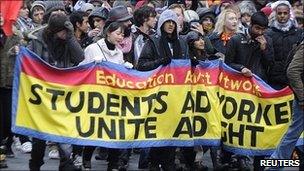Scholarship scheme 'unworkable', says university group
- Published

Students have been protesting over the planned rise in fees
A scholarship scheme to part pay the university fees of students from the poorest homes has been branded "unworkable and unfair".
University think tank Million+ claims the £150m funding for the scheme may not be enough to pay the fees of students who would qualify.
It adds that making universities give a year's free tuition to poorer students could push fees up higher.
The government says it wants to open up universities to more people.
MPs will vote later this week on plans to raise fees to a maximum of £9,000. There are also plans to cut university teaching budgets which along with the fees rise have sparked widespread protests.
Under its national scholarship scheme the government is proposing to fund a year's free tuition for students from the poorest backgrounds - those who were on free schools meals when they were at school.
And universities charging more than £6,000 in fees would be required to give a second year free to poorer students.
'Increase fees'
In a letter to universities minister David Willetts, the chief executive of Million+ Pam Tatlow pointed out that free school meal students were not evenly distributed between universities.
She said proposals that require universities to match-fund a year's free tuition would have damaging consequences for universities which contribute most to social mobility.
These are the universities who admit more students from disadvantaged and free school meal backgrounds.
Ms Tatlow added: "A requirement to fund free tuition is more likely to increase rather than decrease fees in those universities with more free school meal students.
"Nick Clegg has also implied that universities which provide two years' free tuition will be compensated by the government.
"Only those institutions with very few free school meal students and big endowment funds are likely to be able to afford to do this.
"This would immediately disadvantage free school meal students studying at universities with more socially inclusive profiles."
'Life-changing'
The think tank also claimed the £150m scholarship fund was too small to fund the number of poorer students going to university.
It calculated that the scholarship scheme could fund 8,333 students at £6,000 a year or 6,944 at £7,200 a year. If fees were £9,000 a year it would fund 5,555.
However, in the cohort of students graduating last year there were 10,670 who had been in receipt of free school meals.
Universities Minister David Willetts said he wanted as many students from disadvantaged backgrounds who want to go to university to have that life changing opportunity.
"The proposals we have set out will help give poorer gifted students an extra incentive to go into higher education.
"We will be writing to our universities stressing that we will be looking to them to do everything they can to make sure they are attracting our brightest and best students, no matter what their background is."
- Published5 December 2010